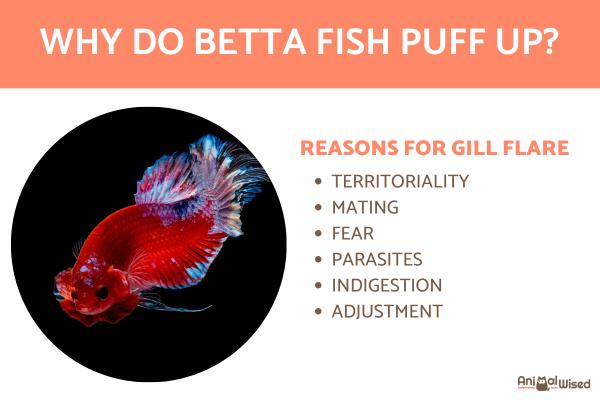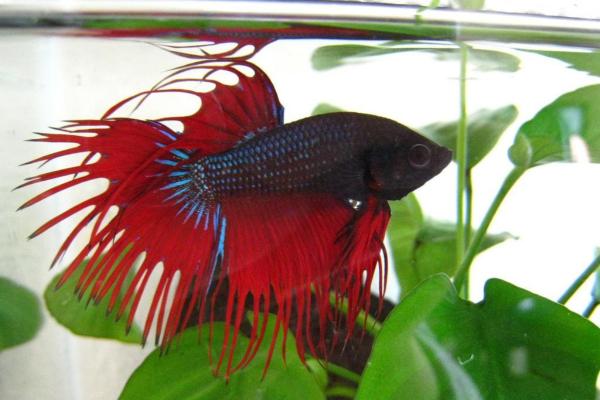
Betta fish puff up as part of their natural behavior, often as a result of their highly aggressive nature. This is often the case for betta fish which share an aquarium with other fish species, some of which should not be allowed to remain in the same tank together. However, there are also pathological reasons for flare ups in betta fish.
At AnimalWised, we explore the possible reasons why do betta fish puff up? We explain the reasons for betta flare by looking at betta behavior, as well as possible diseases which can result in your betta puffing their gill covers.
Betta flare behavior
Otherwise known as Siamese fighting fish, betta fish (Betta splendens) are undoubtedly one of the most beautiful aquarium fish we can keep at home. As their name suggests, they are also one of the most problematic. This is because betta fish are highly territorial with other fish.
Although there is natural aggression and territoriality in betta fish, this is a trait which has been encouraged by breeders. Originally, many breeders bred betta fish to fight for sport in a horrible practice similar to cockfighting. While this practice is fortunately not as common as it once was, the genetic predisposition towards aggression in Siamese fighting fish remains to varying degrees.
Males are territorial with other males, especially when they want to mate. Their territorial aggression is generally a fight for resources. If they feel their resources are being threatened, they will puff up their gill covers, also known as opercula. Also known as flaring, this is a way to show dominance over a rival.
A betta fish will also puff up and become aggressive towards females. They will even nip at them when trying to mate, something which may seem counterproductive. It is not only male betta fish which puff up. Both males and females will do it for courtship and aggression. Although aggressive and prone to flaring up, betta fish can live with other fish in an aquarium, but it will depend on the species. They are often most territorial with smaller fish.
Finally, betta flare behavior doesn't only occur when other fish are around. Betta fish are not used to seeing their reflection in the glass of aquaria, so they might be puffing up their gill covers at themselves. They mistake their own refection for another fish.
Learn about different betta species with our guide to types of Siamese fighting fish.
Dropsy in betta fish
As stated in the introduction, aggression or courtship are not the only reasons why betta fish puff up. There are also diseases which can cause this behavior. Dropsy is an infection of the internal organs which can be caused by various factors including viruses, bacteria or intestinal parasites. It is most commonly caused by the presence of the Aeromonas punctata bacteria in the aquarium. It usually attacks immunocompromised fish and it can be fatal.
Symptoms of dropsy in betta fish:
- Bloated body
- Raised scales
- Exophthalmos (bulging eyes)
- Discoloration
- White feces
The swelling of the fish's body is because of the build up of intraperitoneal fluid. Betta fish are prone to these infections, which is why it is fundamental to clean their tank regularly and ensure general hygiene. Maintaining good hygiene and regularly changing the water in the aquarium will protect your fish from these infections.
How to treat dropsy in betta fish
Since there are various possible causes for the infection, it's difficult to work out the appropriate treatment. Dropsy is a common cause of death among betta fish, which is why it's advisable to act quickly if you suspect one of your specimens might be ill.
You should isolate the affected fish from the rest, and then change the aquarium water. You should also clean the ornaments, artificial plants and other objects found inside.
It's recommended that you know how to deal with this problem in advance, since your betta fish can die in a couple of days. If you know what to treat it with, you can proceed as soon as you notice an inflated stomach and raised scales. Go to your vet for advice on the most appropriate treatment. Dropsy is usually treated with antibacterial products, broad-spectrum anti-parasitics and anti-inflammatories.
After treatment, when the fish starts to get recover, you should start gradually changing the aquarium water. Anti-inflammatories contain steroids, and abruptly eliminating their presence in the water can be counterproductive. Change the water over the course of 3 or 4 days until the medications have disappeared.

Indigestion in betta fish
Dropsy can be confused with indigestion. For this reason, your fish might be puffing up from eating too much. Fish eat dehydrated food, sometimes in large quantities. It then hydrates and can consequently swell up in their stomach. This brings intestinal obstructions which cause the fish to stop eating.
Symptoms of indigestion in betta fish:
- Swollen abdomen
- Un-raised scales
The main difference with respect to dropsy is the position of the scales. When your betta fish eats too much, its abdomen puffs out, but its scales do not stand up. Raised scales are an indication of dropsy.
To prevent your fish from puffing up, you should give it the correct amount of food. Dehydrated foodcan cause problems, so one option is to moisten it minutes before feeding. Doing so will make the food increase in size before being eaten.
Leaving the fish without food for a couple of days should be enough for their digestive issues to resolve themselves. After this time, you will need to implement the measures described above to avoid indigestion in the future. If this doesn't work, you can give the betta a boiled and skinless pea to help intestinal transit.

Other reasons betta fish have a swollen abdomen
As you've seen, your betta fish's puffiness can be a behavioral or physiological problem. There are other reasons that Siamese fighting fish flare up, including the following:
- Lights and sound: if there are lights and sound in the room where the aquarium is located, it is possible the betta fish will puff up at these stimuli. Once they get used to ambient noise and light, they should do it less. However, it is very important for the wellbeing of all fish to keep them in a suitable environment free of stress.
- Adjustment: if you have recently adopted a betta fish and placed it in the aquarium, it is likely they will need some time to adjust to their surroundings. They may be more inclined to have gill flare during this time, but they should stop it eventually.
- Personality: some fish are simply more prone to this behavior compared to others. They may be naturally more aggressive and will puff up because they are wont to do.
- Parasites: in addition to dropsy, other parasite infections can cause the betta fish to flare up. Gill flukes are flatworms know as trematodes which can infest the gills and cause the fish to puff up.
Remember, if the scales are raised then the problem dropsy. Good aquarium hygiene will prevent these types of infections.
This article is purely informative. AnimalWised does not have the authority to prescribe any veterinary treatment or create a diagnosis. We invite you to take your pet to the veterinarian if they are suffering from any condition or pain.
If you want to read similar articles to Why Do Betta Fish Puff Up?, we recommend you visit our Other health problems category.